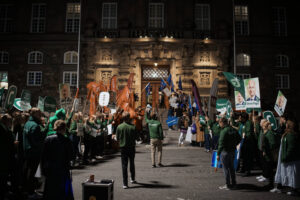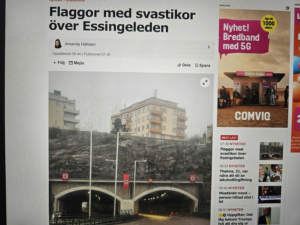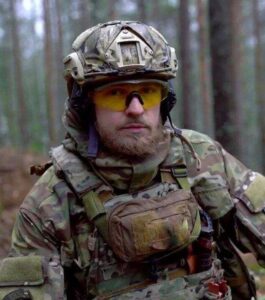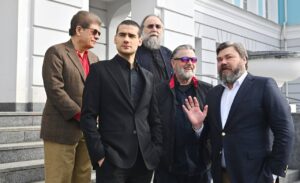In the already distant 2003, the torchlight procession by the name “Lukovmarch” seemed to be a harmless and at the same time somewhat supreme crown of the Transition’s creation. The initial impetus came from the entirely flattened, one-dimensional right-wing political life in Bulgaria that proved unable to hold together the onslaught of its own making. Being only a small portion of the countercultural movements of the time, Lukovmarch’s initiators seemed as slightly shaken and not particularly impressive extensions of the skinhead jerks, although this particular time in tight military uniforms, that were circling in bands around various cities of the country.
They still seem like that though. Yet, today the organizers are far more self-assured, better-versed and, contrary to the predictions of the pay-no-attention-to-those-marginals or don’t-get-obsessed supporters, far more dangerous. Back then, some laughed, others apparently expected more, but predominantly no one gave a damn. To some extent, no one gives a damn still. And why should we? Nevertheless, once a year, in the evening hours of mid-February, darkness heralds the foretold resacralization of misanthropic politics in Europe’s backyard. This resacralization is precisely a result of an almost never-ending repetition; a repetition of the repetition of this now distant genesis, that we did not gave a damn about, even if it was expanding, step by step, spilling over, seeping into our political and everyday rhetoric and thinking, interfering the way we perceived the past and, ultimately, demonizing everything progressive, everything concerned with the future.
Historical ‘Controversies’
The so-called “Lukovmarch” is dedicated to his holiness, general Hristo Lukov. He undoubtedly merits torches, albeit mostly under his own historical feet. He was a Minister of War of the Kingdom of Bulgaria during the late Interwar period (1935-1938). Little later, Lukov became head of the ultranationalist and fascist organization by the name Union of the Bulgarian National Legions (1942-1943). The Legionaries were established as an youth movement by the name Union of the National Youth Legions, who proudly sported a swastika on their official banner. They were initially formed as a small group of school and university students, supportive of fascistic and nationalistic politics that were emerging around Europe at the time and who were seeing themselves as having a historical task to fight against Judaism, communism and anything else their encouraged eyes saw as threatening to “Old Europe.” The fragmentation of the country following the Nuremberg Peace Treaty is, of course, seen as a consequence directly from those same enemies. The Legionaries’ Union, however, has a complex history, mostly because of their somehow different currents, different faction’s leaders. and different agendas.
During the 1940s, the organ of the very wing led by Lukov was running a newspaper by the name “Naroden vodach” (People’s Leader). Lukov himself, as well as most of the distinguished Legionaires, participated on its pages, including Gen. Nikola Zhekov and Gen. Georgi Radkov. In an article for People’s Leader from 08/15/1941 one reads:
Humanity has two enemies, whose defeat Providence has ordained to be the irresistible aarmistine of National Socialist Germany: the world plutocracy and international Jewry. The defeat of these two enemies will also bring about the doom of all their offspring – Freemasonry, Communism, etc. […] We Bulgarians will do our duty as people, as carriers of progress, if we help to defeat these two enemies in our Homeland. […] The signal for this was given ten years ago with the first legionary sermon. It scourged Jewry, communism, and Freemasonry.
Georgi Radkov, The “Apostle of the Young Legionaries”
By 1939, seven years since the Führer came to power, а highly pronounced enthusiast for Bulgaria’s alliance with Hitler, Lukov himself was awarded with an Iron Cross by Nazi-Germany. It was Violeta Yakova, a Bulgarian communist of Jewish origin, who in turbulent 1943—assassinated Hristo Lukov. As Filip Lyapov notes, “… her double identity as both Jewish and communist provided further confirmation of the conspiracy theories involving these two groups” and still does. Despite all the widely available testimonies (and many others, resting in the archives), the overwhelming majority of our society was taught not to recognize ‘the general’ as anything other than a national hero who gave his life for the ‘Fatherland’.
In mid-February 2021, these public trends were reconfirmed on a different, now institutionalized level, by the Sofia City Court. Thanks to the expertise of a well-known reactionary historian, the court ruled on both Lukov’s “controversial historical assessment” and the ‘inability to prove” his inhuman(e) ideological motivations. As a result, of course, came the laundering of the very organization that has been at the heart of the event for nearly 20 years, namely the Bulgarian National Union (BNU), even though the latter even present themselves as ideological heirs of these same Legionaries.
This once again illuminates the way history is, quite literally, produced via the very places the dominant classes dwell in, and, most of all, the hubristic nature of the (neo-)liberal system, with its state and its legal system, which are capable of constituting a particular sociohistorical reality, to an extreme degree mystified and veiled in and for itself. Thus, the very integrity between the phenomenon (Lukovmarch) and its perverted grounding (the historical fact) completes this process of endless repetition and violent permutation. As we will see in a moment, over the years the position of the various political parties, mayors, courts, law enforcement agencies, and so on, despite their rhetorical opposition, has in fact supported the rerealization of this almost sacred ritual. They have backed up the creation of a myth, one that is both terrifying (from the position of the still sturdy historical mirror) and attractive (from the position of the broken but never silent one). For those tormented the most by the endless economic malaise—who, trusting the statistics, are over 80% of Bulgaria’s population—the mythologized greatness of the Kingdom of Bulgaria seems to be the only ideal worth pursuing. Indeed, it is precisely the return to a somehow cyclical regime of historicity that seems to characterize the (post-)fascist trends most precise.
Lukovmarch as Bad Infinity
During the years, the event found its way to unite most of the reactionary forces within our society. It is the production of what no longer is, its distortion and adjustment to set up that sort of present, awaiting or realizing a concrete political and economic gain that enormously benefits these same forces. This nationalization of history is, of course, a pan-European phenomena, not specific to Bulgaria or the ex-Soviet satellites in general. It is a phenomenа mostly of those countries involved in the war, who knock to redeem not only their institutionalized selves, but especially the interests of the (then-and-now) dominant classes. The danger embodied by this same trend, on the other hand, fully reflects its magnitude.
Starting as a small procession of, as I noted above, under-articulated and thoroughly marginalized groups of skinheads, mostly devoted to football hooliganism and abuse, Lukovmarch gradually transformed into an event of international significance. Over the years we have witnessed visits from great part of the far-right, neo-Nazi and fascist groups from all over Europe and, perhaps, even beyond. At some point the former leader of its main organizers— i.e. BNU,—Boyan Stankov “Rasate” get awarded the title of “honorary chairman” of the Spanish Falangs, as well as regional leader of Europe-Action. By 2005, BNU-Edelweiss was part of the coordinating ultranationalist structure of the officially dismantled European National Front (ENT), along with organizations such as the German College (German: Deutsches Kollege), the National Democratic Party (German: NPD) and the Free Resistance (German: Freier Widerstand), the Belgian Flemish Blok (Vlaams Blok), the Spanish Falange (La Falange), the French Guarde Franque, and the Romanian New Right (Romanian: Noua Dreapta), the Dutch National Alliance (Nationale Alliantie) and others, as—according to the Bulgarian Helsinki Committee—the total number of ENT activists in that period exceeded 700 thousand.
After infighting and an internal coup, Rasate defected to younger, far less explicitly Nazi strategists. From this denouement not only did the organization become more attractive to many, and in that sense more powerful, but it also became way more dangerous insofar as only a small part of what was going on within it began to surface. Lasting links were also established with local political forces and parties (although during the time of Rasate such were a fact, be it for a while, the most prominent of which was with Volen Siderov’s ATAKA party), which to this day have not faded, but—on the contrary—have become stronger and stronger. By the time of writing, IMRO is one of those less honorable official examples. Judging by the court case I described above, however, there are perhaps other, much less outspoken nationalists supporting BNU from the closet. Contacts were established with far more active—not that nostalgic but young and “joyful”—organizations on the international scene. Along with this, the event itself gained strength.
In 2019, on the eve of Adolf Hitler’s birthday, after an official gathering in Sofia, the BNU launched a new multinational organisation by the name of Fortress Europe. Among the founding members are the French Les Nationalistes, Hungary’s Légió Hungária, Czechia’s Národní a sociální fronta, Germany’s Die Rechte and Poland’s Szturm. According to the official founding statement, the Fortress deepens those groups ‘now decade long collaboration and coordination.’ We know for sure that some of these parties participate regularly in Lukovmarch, although we are not sure exactly what kind of activity the new nationalist “international” is carrying out.
In 2020, Yordanka Fandakova, still acting mayor of Sofia, officially banned Lukovmarch. The Supreme Administrative Court upheld the mayor’s order and its decision cannot be subjugated to appeal. Аlthough the mayor (now annually, by tradition) reaffirms the order, Lukovmarch’s organizers continue to carry out the event, despite the well-known ban, and the law enforcement agencies continue to accompany them through the capital’s streets. The same year ‘German federal police in North-Rhine Westphalia have barred nine people, eight men and a woman, from boarding a flight to Bulgaria’s capital city Sofia where they had intended to participate in the Lukovmarch on February 22’. However, the first two years of the ban, only a vigil was held in front of His Holiness the General’s home.
Yet this 2022, the usual gathering at the pylons in front of the National Palace of Culture split into three and took different routes to reach the Holy General’s resting place and eventually his home. Not one, but three marches, defying the reaffirmed prohibitions on the event. As far as the international side of the event is concerned, we have definitive proofs for this year participation of the Ultras Not Reds faction (a worldwide, hooligans, and ultras fascist movement) from Valencia (and probably elsewhere as well). Moreover, we know from French comrades that Jeune Nation (connected to Les Nationalistes, whose presence was also confirmed) are regular participants, at least in the past few years. There have also been delegations from Sweden’s Nordic Resistance Movement (NRM), Germany’s Die Rechte, as well as Northern Macedonian associates. We can safely assume that the other members of the so-called Fortress were also present.
We observe, in other words, a bad infinity, the end of which should have come, but it seems as if it is not even imminent. We are observing an upsurge which should have taken the opposite direction but which never stops. Public awareness campaigns do not help. Neither, apparently, does state ‘intervention’, much less the efforts of the antifascist and our march, which happens on the same day and usually in much larger numbers. The disillusionment with the political, social and economic system in the country is huge. Its course, on the other hand, is skillfully steered in the opposite direction. National populist forces (such as that of Revival, There is Such a Nation, etc.) continue to gain strength, and while their supporters may not know about or often do not even participate in the very processions we are interested here, that does not make them any less dangerous. We don’t expect the event to grow into anything much larger than it is now. At the same time, the exchange of experiences and international complicity, the gaining of certainty in the approaches and ideas of the march leaders, are in themselves no small threat.
On the contrary, revisionist attitudes, however marginal (which is a far less valid argument today than it was 18 years ago, when the Lukovmarch was just establishing itself) are already a symbol, are already a threat. Similar to the hard chancre, as a primary symptom of syphilis, any such initiative, even at its very appearance, should raise concerns. What remains if it has been part of the political life of any country for that long.
Hardly any of history makes sense when bullies bully, either with words or physically. It is in this bullying that they discover their rightness, in the age-old nature of violence, of subjugating the other by force. What we have yet to condemn, as an organism having at least some form of immune system, is initiated by those in our society who feel as if they have never been silent. Truths torn out of their mouths, cries of immense rightness that know neither time nor place. They see those truths as older than the world and any culture, as something that predates all that can be predated. It is the brokenness of the mirror that we need to point out, it is their final silence that we must find strength to generate, it is the bad infinity that we have to put an end to.







